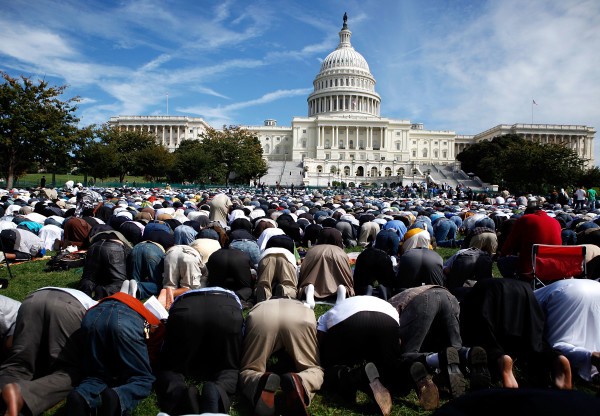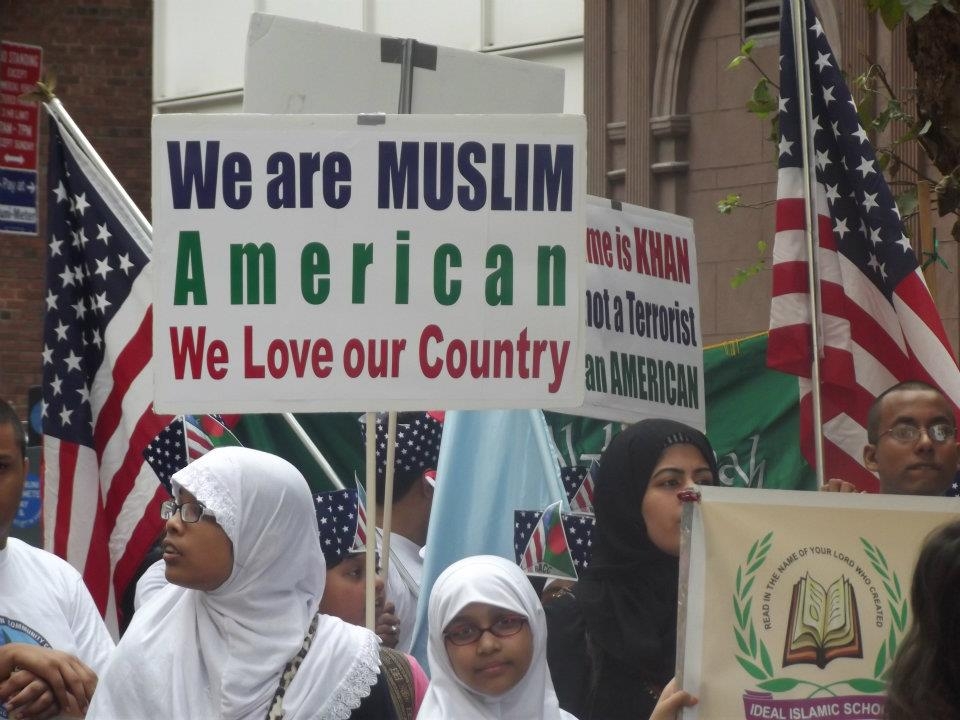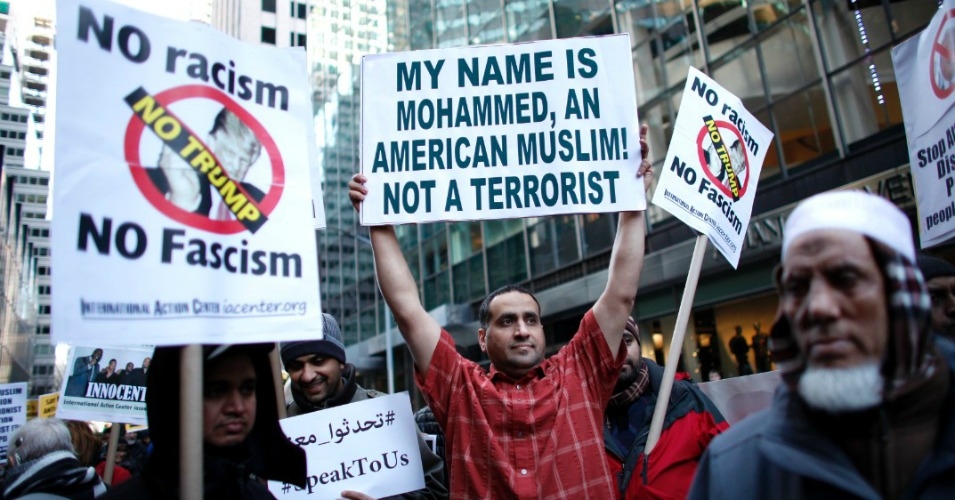
- For Muslims now, 15 years since 9/11, ‘it seems more people are more openly hateful’ (Penn Live)
- Muslim Americans still struggle with hate crimes, 15 years after 9/11 (AOL)
- 15 years after 9/11, unwelcome spotlight returns to Islam (USA Today)
- Muslims are still under attack for their beliefs 15 years after 9/11 (Desert News)
These headlines best reflect the dilemma of the seven-million-strong American Muslim Community which remains target of assault, bigotry, hate-crime and profiling, one and half decade after the horrific terrorist attacks. Muslim men were attacked, some fatally, while Muslim women in headscarves were harassed and mosques and Muslim businesses were vandalized.
In the immediate aftermath of the Sept. 11, 2001 terror attacks, U.S. Muslims were targeted by a slew of hate crimes, some tragically resulting in loss of life. But 15 years after the attacks, religious tolerance and assimilation into the fabric of the country continues to largely elude Muslims in America, whether they are from Middle Eastern or Asian countries, American-born and bred, white or black, says Ivey DeJesus of Penn Live.
Tellingly, in the 15 years since the 9/11, hate towards Muslims has become more openly acceptable. Anti-Islam rhetoric is no longer playing out behind closed doors. It’s explicit, not implicit anymore.
A new report by Georgetown University’s Center for Muslim-Christian Understanding has documented an upsurge in violence against Muslims in the United States. The report cites 180 reported incidents of anti-Muslim violence during the period between March 2015 and March 2016. Among these were 12 murders; 34 physical assaults; 56 acts of vandalisms or destruction of property; nine arsons; and eight shootings and bombings. Among the incidents noted were the murders of three university students in Chapel Hill, North Carolina, the murder of an Iranian-American in California by a white supremacist, and a road-rage incident in Houston in which a Palestinian-American man was killed by a man who told him to “go back to Islam.”
Not surprisingly, there were nearly four times as many attacks against mosques in 2015 compared with 2014, according to a report compiled by the Council on American-Islamic Relations, the largest American Muslim civil advocacy group. There were 78 instances where mosques were targeted — counting vandalism, arson, and other destruction — in 2015. There were 20 total in 2014, the group counted. Some of the incidents from December 2015 include the firebombing of a mosque in Coachella, California and the discovery of a severed pig’s head at a mosque in Philadelphia, Pennsylvania. On the other hand the 2016 CAIR California Civil Rights Report, which reveals that anti-Muslim bias incidents saw a significant increase since last year. A total of 1,556 incidents, 295 from the Bay Area alone, were reported to CAIR-California over the course of the 2015 year. These included complaints involving: employment discrimination, federal law enforcement questioning, housing discrimination, immigration issues, hate crimes, and school bullying.
Few incidents have underscored the paranoia and misconceptions that a wide section of America has about Muslims than the arrest on September 14, 2015 of a 14-year-old Muslim boy in Dallas, Ahmed Mohamed. He was arrested at his MacArthur High School after the school officials called police because he had brought to class a homemade clock that allegedly looked like a bomb. He was suspended from the School for three days.
Relating all the hate attacks, discrimination, mosque vandalism, and other negative incidences related to the American Muslims are beyond the scope of this article.
2016 Elections
Muslim Americans have been at the center of this year’s presidential election. As the presidential election draws near, American Muslim community is facing increasing challenges in terms of Islamophobic rhetoric by public figures and the resulting hostility and discrimination. Donald Trump’s claim that he witnessed “thousands” of people “cheering” in New Jersey following the September 11, 2001, attacks sparked controversy. Even more controversy followed with the Republican nominee calling for a temporary ban on Muslims entering the country. In a move that goes beyond his call to ban Muslim immigration into the United States, Donald Trump said in June that profiling American Muslims is something that needs to be considered. In an interview with Face The Nation on CBS, Trump said “I hate the concept of profiling, but we have to use common sense. We’re not using common sense.”
Throughout the campaign, Trump has advocated increased surveillance of Muslim American communities and mosques. He also said he would consider registering Muslim Americans in a database, or requiring Muslims to carry special identification cards. Trump is persisting with his attack on Muslims because it has proven to be his strongest issue, according to exit polls in many Republican primaries. In the pivotal March 15 contests, exit polls of voters in the five states that held elections revealed a remarkable fact: two-thirds of Republican voters support Trump’s proposal to ban Muslim immigrants and tourists. In some states that held early primary elections – South Carolina and Missouri – nearly 75 percent of Republican voters support the ban. Apparently, he is taking advantage of deep-seated fears of Muslims among Americans, especially Republican voters. Trump is winning votes because he is willing to go further than any other candidate in tarnishing all Muslims.
Trump even provokes controversy when he criticized the Muslim parents of a slain American soldier who was killed in Iraq by a suicide bomber in 2004.
‘The Trump Effect’: Hatred, fear and bullying on the rise in schools: The presidential race is stoking fears and racial tensions in America’s classrooms. In April 2016, The Southern Poverty Law Center published a report titled “The Trump Effect: The Impact of the Presidential Campaign on our Nation’s Schools.” “My students are terrified of Donald Trump. They think that if he’s elected, all black people will get sent back to Africa,” one middle school teacher told the SPLC. The teacher was one of more than 2,000 educators who opted to take a survey conducted through the SPLC’s “Teaching Tolerance” program. “I have had Muslim students called terrorists,” said another teacher who submitted comments to the survey. “There is a boy from Mexico, who is a citizen, who is terrified that the country will deport him if Trump wins,” wrote a third teacher. “He is also scared that kids and grown-ups can and will hurt him.” Overall, more than two-thirds of the teachers who took the survey reported that their students — mainly Muslims, immigrants and children of immigrants — were worried about what could happen to them and their families after the November election. And more than one-third of the teachers said they’ve noticed a rise in anti-immigrant and anti-Muslim sentiment among their students as well.
Divisive presidential election negatively impacts American Muslims: A majority of Muslim Americans feel unsafe in the United States due to a divisive presidential election that, they report, has negatively impacted their lives, according to the preliminary results of a recent study conducted by Adelphi University, New York. Researchers assessed the impact of Islamophobia on the Muslim American community during the corrosive campaign for the White House. The results, although troubling, were not surprising, say researchers, given the rancorous rhetoric demonizing Muslim Americans, their role in society, and how their culture clashes with purported mainstream American values. Among the more disturbing of the study’s discoveries: 50 percent of respondents said they feel unsafe; nearly two-thirds reported experiencing discrimination in the past year; and perhaps most noteworthy, 93 percent reported that election-year Islamophobia had “some to extreme” negative impact on theirs and their families’ lives. “There’s a lot of fear,” said Dr. Wahiba Abu-Ras, an associate professor of social work at Adelphi University who is studying the mental health of American Muslims. More than half of participants (57 percent) described their experiences as “extremely stressful” and 31 percent reported their experiences as “somewhat stressful.”
Trump’s bigotry has inspired American Muslim voters: According to USA Today, “after 9/11, some Muslim Americans said they were so fearful that they ventured from their homes only when they had to. Not so anymore. With the scrutiny of Muslims, the diverse faith group has become organized and outspoken. Muslim civic and religious groups are holding news conferences, staging anti-terror prayer vigils and interfaith events, and meeting with law enforcement to act against bias and show that they are as American as the next person. They’re bombarding media with condemnations of terrorism after all attacks, including those in the U.S., France, Iraq and Pakistan that targeted non-Muslims and Muslims alike. Groups have held voter registration drives. Some have run for office. In North Jersey, both Teaneck and Prospect Park have Muslim mayors, and Muslims serve or are seeking seats on councils and school boards in Paterson, North Bergen, Passaic, Paramus and Clifton.”
Muslims, who have generally refrained from city politics, had begun organizing get-out-the-vote drives in many cities and showing up in record numbers at the polls.
Washington Post writes under the title: “Donald Trump’s bigotry has inspired U.S. Muslim voters like no candidate before”: Donald Trump? Your bigotry has inspired Muslim American voters like no presidential candidate has done before.
The American Muslim community has responded to its challenges in the post 9/11 America with political activism and an intensive interfaith and outreach drive to build bridges and reach other ethnic and faith communities. It gains strength from the principles of freedom, liberty and equality on which this great nation was founded.
On the positive note
All is not downbeat for the American Muslims. Despite prevalent negative public opinion American Muslims get support from the fellow Americans in their time of distress.
Taken a strong stand against a rising climate of Islamophobia in America, the California State Assembly has declared August as the ‘Muslim Appreciation and Awareness Month.’ The Assembly passed a resolution that declared August 2016 as Muslim Appreciation and Awareness Month, as part of an effort to acknowledge the “myriad invaluable contributions of Muslim Americans in California and across the country.” The sponsors of the resolution pointed out that California is home to over 240 mosques, more than any other state in the country. The resolution also decried the discrimination that Muslim Americans have had to endure in the years following the September 11 attacks.
In July last, Montgomery County, Maryland, issued a proclamation reaffirming the county’s support for its Muslim citizens. The decision to issue the proclamation came out of concern over anti-Islamic rhetoric in the wake of attacks in Paris and Brussels. The proclamation was issued to demonstrate the County Government’s firm belief that people of all religious faiths are valued and respected and will be safe; and that acts of hatred against Muslims will not be tolerated. The county executive’s office has estimated that there are about 12,000 Muslims in the county — roughly 1.2 percent of the county’s total population.
St. Johns County of Florida issued a Proclamation expressing County’s strong adherence to fostering civility among its diverse community of residents. The proclamation declared that May, 2016 be designated as: Civility Month; and “calls upon all citizens to exercise civility toward each other this month and throughout the year.”
A the Muslim community faces difficulty in establishing new mosques or expand the existing Islamic Centers, Afton (Minnesota) City Council approves plans for mosque in city. The Newton County, Georgia, has decided to lift moratorium on permits for all houses of worship.
The U.S. Education Department has announced it will begin collecting data this year about allegations of discrimination or bullying of students based on their religion, bringing new attention to what educators and advocates call a growing problem in public schools, particularly for Muslim students. Catherine E. Lhamon, the department’s assistant secretary for civil rights, said “Students of all religions should feel safe, welcome and valued in our nation’s schools,” she said in an announcement.
Seven million strong American Muslim community has welcomed the appointment of first Muslim federal judge. On Sept 7, 2016, President Barack Obama nominated Abid Riaz Qureshi, a Washington lawyer, to the US District Court bench who would become the country’s first Muslim-American federal judge if he is confirmed. Abid Riaz Qureshi is a lawyer at the Latham & Watkins law firm in Washington, specializing in health care fraud and securities violations, according to the White House. Obama nominated him to serve on the US District Court for the District of Columbia. Qureshi earned the Champions of Justice Award in 2012 by the National Law Journal’s Legal Times for upholding the legal profession’s core values through public service, pro bono work and advocacy for civil liberties.
Abdus Sattar Ghazali is the Chief Editor of the Journal of America (www.journalofamerica.net) Email: asghazali2011 (@) gmail.com














































